
by Beth Kassab | Oct 18, 2024 | Election, News, Uncategorized
Steve Leary and Kelly Semrad in final fundraising stretch for District 5 Orange County race
The two are on the Nov. 5 ballot in the only open seat this year for the Orange County Commission
Oct. 18, 2024
By Beth Kassab
Former Winter Park Mayor Steve Leary remains the fundraising leader in the District 5 Orange County Commission race against UCF Professor Kelly Semrad with donors from the tourism and development industries continuing to drive his total.
Leary raised $322,000 and spent $218,000 through his campaign account and a political committee he also controls, according to the most recent filings. The bulk of that came in before the August primary, when Leary trailed Semrad to a second place finish by 2,800 votes.
Recent Leary campaign donations include $12,000 from hotelier and philanthropist Harris Rosen and his companies plus another $1,000 from Frank Santos, a member of Rosen’s executive team.
On Thursday, Leary posted an endorsement from Rosen on his campaign Facebook page in which Rosen says Leary is “the ONLY candidate qualified to serve.” Leary wrote that he is proud to have Rosen’s support and called him a “TRUE tourism expert” — an apparent dig at Semrad, who is known as an expert in tourism economies and conducts research and teaches at UCF’s college of hospitality management named for Rosen.
Neither Leary nor his campaign responded to a request for an interview for this story.
The Central Florida Hotel & Lodging Association’s political committees recently gave Leary $2,000.
Another $2,000 came came from a company affiliated with the developers behind the proposed Sustanee project that includes nearly 2,000 homes on ranchlands in east Orange County. The developers sued the county over the commission’s rejection of the project earlier this year.
Kelly Cohen, a lobbyist for Lake Nona developer Tavistock, which is also attempting to develop additional rural lands, gave $500. Developer Alan Ginsburg and BusinessForce, the political committee for the Orlando Chamber of Commerce, each gave $1,000.
Development of rural lands and how the county should divvy up the dollars collected from the Tourism Development Tax are key issues in the District 5 contest as well as the races for Districts 1 and 3.
The Nov. 5 ballot also includes two questions for voters related to development. The first asks voters to designate a rural boundary in the county and the second would give the County Commission the power to stop potential developers from voluntarily annexing their land into other jurisdictions such as the city of Orlando.
Leary has said he supports establishing the rural boundary, but has not answered a question that would give the rural boundary measure its teeth: Whether he supports the move to allow the county commission to block annexations by the cities.
Semrad is a vocal advocate of both ballot questions and is also pushing for more tourist tax money to be spent on local projects such as transportation vs needs exclusive to the tourism industry.
She has trailed in fundraising with a total of $86,000 so far, according to the available filings. She does not have a political action committee.
Her contributions include $1,000 from Orlando Democrat Rep. Maxwell Frost’s political committee, $500 from Ruth’s List and $1,000 from the Orange County Firefighter’s Association. Her supporters also include local names such as political pundit and advocate Dick Batchelor ($250); retired Judge Cynthia McKinnon ($100) and others.
Semrad said she knows she won’t make up the fundraising gap between her and Leary, but is focusing on talking with as many voters as possible.
“We’ve got more than 100 volunteers who knock on doors every weekend and waive signs,” she said.
While few voters open to door to talk with canvassers face-to-face, she’s noticed many speak to her or the volunteers via phone through their doorbell camera apps — either from inside their homes or wherever they happen to be.
“Those interactions have been way more informative,” she said. “They’ll say, ‘I love your platform,’ … Our numbers are coming in really strong.”
While Leary has a significant fundraising lead over Semrad, he is behind the top fundraisers in Districts 1 and 3 where Austin Arthur raised about $500,000 through his campaign account and political committee and and Mayra Uribe has raised nearly $500,000 through her campaign and committees that have supported her.
WinterParkVoiceEditor@gmail.com
To comment or read comments from others, click here →

by Beth Kassab | Oct 17, 2024 | City Commission, News, Uncategorized
Winter Park closes in on major CRA expansion, celebrates wins from Hurricane Milton
The CRA is expected to help fund stormwater projects that became a high priority after Hurricane Ian in 2022.The impacts felt by Hurricane Milton were less severe
Oct. 17, 2024
(Photo caption: Commissioners Craig Russell and Kris Cruzada assist residents with sandbags before Hurricane Milton made landfall last week. Courtesy of the city of Winter Park.)
By Beth Kassab
Winter Park officials on Thursday celebrated relatively few power outages and far more contained flooding that occurred after Hurricane Milton compared with Hurricane Ian two years earlier as they also took steps to finalize a major expansion of the city’s Community Redevelopment Agency.
The CRA expansion will help pay for a number of projects within its boundaries that cover downtown from Interlachen Boulevard to roughly U.S. 17-92 and — if the new borders get approval from neighboring Orlando and Orange County — Fairbanks Avenue to Interstate 4.
The two-year process to expand the CRA and extend its sunset date from 2027 to 2037 coincided with the time Winter Park also contended with the fallout from Hurricane Ian, which raked through Central Florida on Sept. 29, 2022 caused the worst inland flooding in modern memory. The storm dropped 13 inches of rain, according to the tally from Orlando International Airport.
Milton brought heavy rains, too, but the Winter Park total is estimated in the 5 to 6-inch range, according to Gloria Eby, the city’s director of Natural Resources & Sustainability.
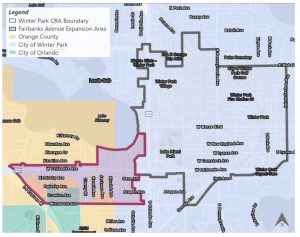
The proposed CRA expansion.
Less rain combined with actions the city vowed to take ahead of the next big storm led to fewer problems overall.
Mayor Sheila DeCiccio commended the city staff for “a truly outstanding job,” noting “everything I have been to — people are in awe of the city of Winter Park.”
City Manager Randy Knight said “a lot of improvements have been made since Ian.”
As a result, there were no reports of flooding inside homes this time and most Winter Park residents had power from the city-owned electric utility throughout the storm. At peak outage, 275 customers were without power, according to the city.
“The electric utility knocked it out of the park,” Knight said, crediting the city’s long-standing efforts to underground all of the city’s power lines, which is about 80% complete.
“It took courage 20 years ago when this commission decided to buy the utility,” he said. “Every commission since then has kept [the undergrounding project] in the budget … and we’re seeing the benefits today.”
Storms like Ian and Milton, though, brought far more rain than wind to the city. And that causes more issues with flooding versus trees downing power lines.
As a result, the commission has focused on studying stormwater projects. In fact, a meeting for commissioners to discuss the results of water basin studies was postponed twice in recent weeks — once for Hurricane Helene and then again for Milton. The meeting is now set to take place next week.
DeCiccio said Thursday that the additional money from the CRA expansion would help, in part, with drainage issues that fall within the agency’s boundaries. Orlando and Orange County are set to take up their ends of the agreement before the end of the month and, if approved, the CRA expansion would mean an additional $57 million in tax revenue that would remain in Winter Park rather than going to the county.
The city took measures to avoid flooding ahead of Milton such as opening lake drains or adjusting weirs to improve water flow where possible.
But more is needed. For example, before Milton landed city workers drained the pond at MLK Park near the library, but some streets still flooded nearby, though no water was reported inside homes this time around.
WinterParkVoiceEditor@gmail.com
To comment or read comments from others, click here →
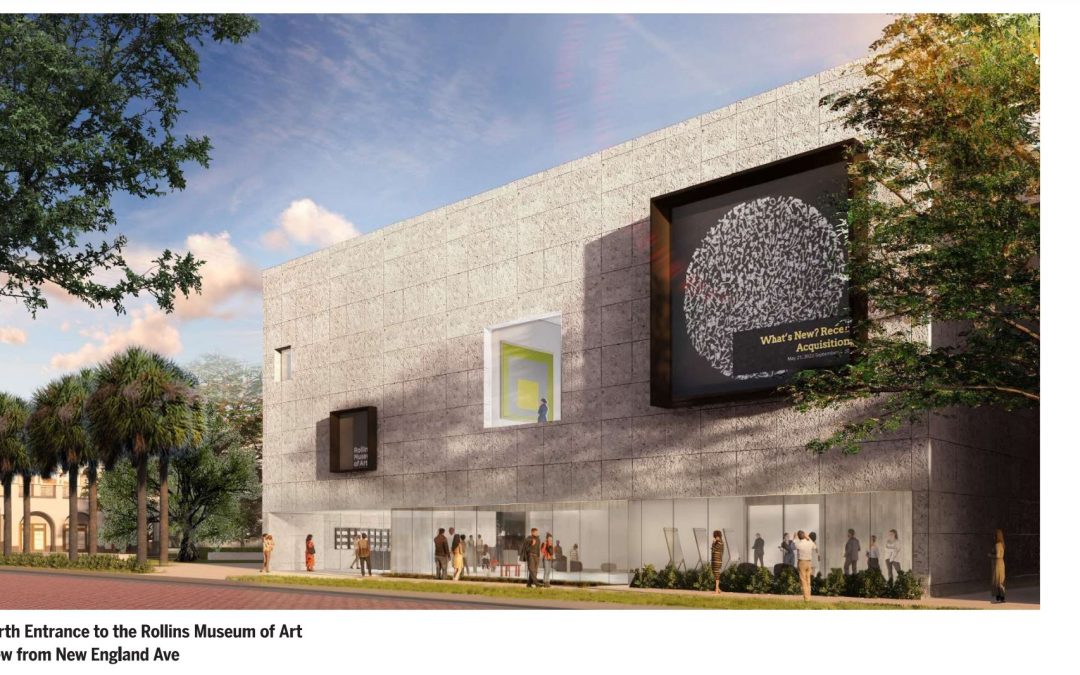
by Beth Kassab | Oct 3, 2024 | City Commission, News, Taxes, Uncategorized
Winter Park Playhouse, Rollins come out as winners in TDT recommendations
They are among 11 arts and culture projects that the Tourist Development Tax board is asking the County Commission to fund
Oct. 3, 2024
By Beth Kassab
The Winter Park Playhouse and the Rollins Art Museum are on track to receive their full request for dollars from a portion of Tourist Development Tax money set aside for arts and cultural projects over the next five years.
The playhouse project, through a partnership with the city of Winter Park to purchase and renovate its current building after nearly losing its lease, will receive $8 million between now and 2028 if the recommendations from the Tourist Development Tax Advisory Council are approved by the Orange County Commission later this month.
The Rollins Art Museum, which made a bid to take over the old Winter Park Library but was pushed aside for the Blue Bamboo Center for the Arts, will receive $10 million between 2026 and 2028, according to the recommendations.
The college announced this week that museum leader Ena Heller is leaving to take a position as the next director of the Boca Raton Museum of Art, but President Grant Cornwell told the Voice in a statement that the vision for a new museum will continue with a broad base of support.
“It has been an honor to work alongside Ena, whose visionary leadership has transformed the Rollins Museum of Art into an integral part of the College’s mission,” Cornwell said. “I am deeply grateful for her contributions and creativity and for ensuring the museum’s successful standing as we build upon the foundation she is leaving. The museum has strong support and a vital group of members, donors, partners, and patrons supporting it, and we are excited about this next stage as we come to closure on our future museum.”
The County Commission will take up the funding requests for final approval on Oct. 29.
Earlier this year, local arts groups were invited to apply for grants from $75 million of tourist tax money set aside over the next five years for local arts and cultural projects. The tax on hotel rooms brought in a record $359 million last year in Orange County, a significant recovery from the pandemic years, which saw collections drop to about half that amount.
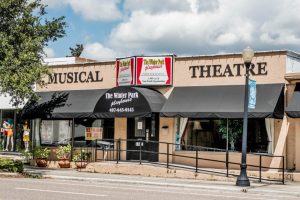
Winter Park Playhouse
The bulk of the hotel tax goes toward paying off the construction costs and operating the Orange County Convention Center, other large venues and Visit Orlando, the publicly-supported organization that markets Orlando as a destination.
The convention center’s operating expenses exceed its revenue so far this year by $12.6 million, according to the comptroller’s report at the Sept. 27 meeting. The subsidy paid by the county out of tourist tax dollars to keep the convention center operating in the black is tracking higher this year than the previous two years, the report showed.
In all, 14 groups originally applied for the arts money with requests totalling $126 million.
Three groups were deemed ineligible for the funds, leaving 11 groups with requests totalling $94.2 million — nearly $20 million more than the allotted $75 million budget for the projects.
A committee led by former Orange County Comptroller Martha Haynie met to rank the projects and recommend how much each would receive.
The Tourist Tax Council, which includes Orange Mayor Jerry Demings, Orlando Mayor Buddy Dyer, Eatonville Mayor Angie Gardner, four hotel owners or industry representatives who must remit the tax and two others, accepted those recommendations at its meeting last week.
Haynie urged the board to reconsider the criteria for future local arts projects to put less emphasis on driving overnight hotel stays — a move that she said could help demonstrate how the tax is used to benefit local residents vs. the tourism industry.
“I think when the Board of County Commissioners can demonstrate the interest and the support of local cultural organizations it supports the position county has always taken,” to reserve the bulk of the tax for industry projects amid pressure to expand how the tax is used, Haynie said. She noted that expanding uses of the tax “in the long run probably would not serve the county as well as it has been served today.”
Intensified calls to use some of the hotel tax revenue on local projects such as roads or train lines are playing out in three county commission races on next month’s ballot. That is especially the case in District 5, which represents Winter Park, where former Mayor Steve Leary is receiving financial contributions from the tourism industry against Kelly Semrad, a UCF professor who studies tourism economies, and is calling for the tax to more substantially benefit people who live in Orange County.
Demings focused his comments on the “financial readiness” of some of the organizations who requested money.
“We have had some challenges like the Pulse Museum and others when they don’t execute the fundraising to cover the gap to do the project and then the project gets extended and the price escalates and then they come back and request additional money,” Demings said, though he said he was pleased to see geographic diversity in the list which touched on Winter Park, Winter Garden and Apopka. “The list looks pretty good, but I still remain somewhat concerned about the ability of these organizations to cover the gap … so we’ll see where this ends up.”
Haynie’s committee recommended all but three organizations receive the amount of funding they requested. The recommendations to be considered by the County Commission later this month are:
- City of Apopka: $13.1 million to construct and improve softball fields, the amphitheater and other facilities. Estimated total cost of the project is $13.3 million.
- 4R Foundation: $12 million for a community events center plus and outdoor stage and lawn at 4Roots Campus, which also includes a farm and classroom space in Orlando’s Packing District neighborhood. Estimated total cost of the project is $65 million.
- Orlando Science Center: $13.9 million enlarge and remodel the outdoor terrace and event venue. Estimated total cost of the project is $14.1 million.
- Rollins College: $10 million to construct a new art museum for new art museum. Estimated total project cost is $30.6 million.
- Orlando Philharmonic Plaza Foundation: $2.1 million to improve the auditorium, including a patron’s room. Estimated total project cost is $3.1 million.
- Winter Garden Art Association: $4 million for a new museum next to the current space. Estimated total cost of the project is $7 million.
- Orlando Family Stage: $5.8 million to remodel and operate the auditorium. Estimated total project cost is $7.6 million.
- City of Winter Park : $8 million to acquire, enlarge and remodel the Winter Park Playhouse. Estimated cost of the total project is $10 million.
- Friends of the Mennello: $2 million (request was $13 million) to enlarge and improve the folk art museum. Estimated total cost is $30 million.
- Orlando Museum of Art: $2 million (request was $7.2 million) to repair the roof and HVAC system. Total cost of the project is estimated at $7.5 million.
- PAST/Wells’ Built Museum: $2 million (request was $5 million) to acquire the property and construct and improve the museum and auditorium. Estimated total cost is $10 million.
WinterParkVoiceEditor@gmail.com
To comment or read comments from others, click here →
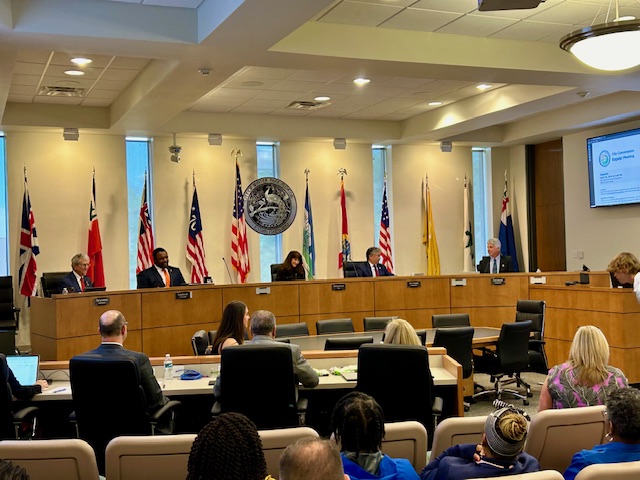
by Beth Kassab | Oct 1, 2024 | City Commission, Election, News, Uncategorized
Kris Cruzada to seek reelection, but Todd Weaver decides not to run
Two City Commission seats are up for grabs in the March election — one political newcomer has already filed
Oct. 1, 2024
By Beth Kassab
Kris Cruzada will seek a second term in Seat 3 on the City Commission while Todd Weaver has opted out of running again for Seat 4 ahead of the March 11 election.
Warren Lindsey, a well-known criminal defense attorney who has lived in Winter Park for 30 years, has filed to run for the seat left open by Weaver’s decision.
Lindsey is a first-time candidate for office and currently serves on the city’s Planning & Zoning Board.
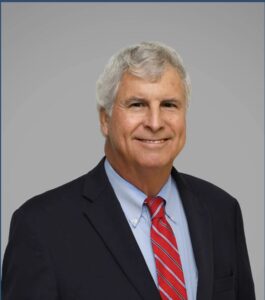
Warren Lindsey
That experience, he said, led to a desire to get more involved in city government.
“It’s wonderful — you really see democracy in action,” Lindsey said. “People from all walks of life come up to the podium.”
If elected, Lindsey said his priorities will be keeping taxes low (Winter Park has the second lowest millage rate among local cities) while preserving the quality of city services, including the police and fire departments.
He’s also interested in economic development and improving the health of the Winter Park Chain of Lakes.
Lindsey, who graduated from Stetson University and the University of Florida law school, practices at Lindsey, Ferry & Parker and previously practiced with Chandler Muller and Kirk Kirkconnell, who both died from cancer in 2012. The Winter Park group was known for taking on some of the highest profile criminal cases in the state.
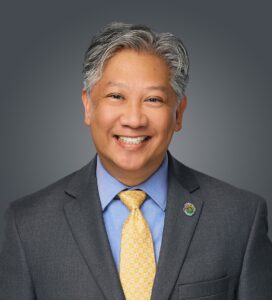
Kris Cruzada
Weaver, an engineer who was first elected in 2019, said his professional responsibilities are taking more of his time so he decided against seeking a third term.
Cruzada, an attorney first elected in 2022, said he wants to continue initiatives he started in his first term such as working with his fellow commissioners to shore up the city’s aging infrastructure, including roads and flood prevention measures. He also wants to continue to make the building code more predictable so that landowners have more clarity over how they can develop their property.
“I want to continue on the path of what I set out to do,” said Cruzada, a lifelong resident of the area.
He graduated from the University of Central Florida and earned a law degree from St. Louis University. Today he practices family and personal injury law and works for his family’s property holdings company.

Todd Weaver
Candidates looking to enter one of the city races must qualify by Jan. 21. They are elected to three-year terms and can serve a maximum of four terms or 12 years on the board.
The March 11 ballot will also include a referendum asking voters whether or not the city should keep in place its ban on gas-powered leaf blowers to help regulate noise and emissions. The current ban, originally passed in 2022, is not yet being enforced after a controversy erupted earlier this year when landscape companies argued the rule imposed too heavy of a financial burden.
WinterParkVoiceEditor@gmail.com
To comment or read comments from others, click here →
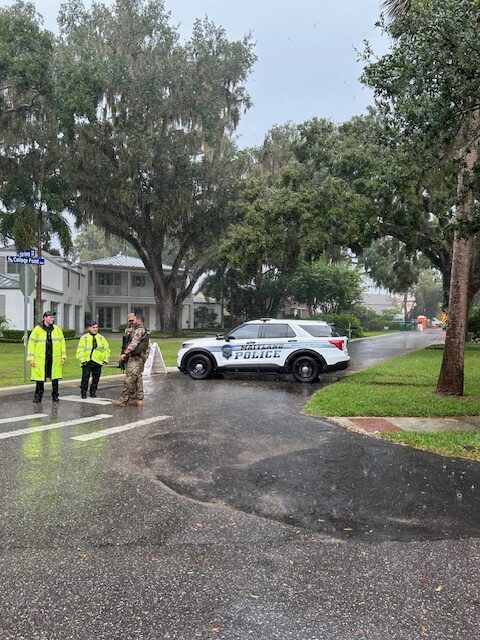
by Beth Kassab | Sep 25, 2024 | Election, News, Uncategorized
J.D. Vance fundraiser at home of Golden Corral owner shut down residential streets
The campaign event also prompted heavy police presence in the neighborhood around Lake Virginia
Sept. 25, 2024
By Beth Kassab
A fundraiser reportedly featuring J.D. Vance at the home of Eric and Diane Holm shut down residential streets off Lake Virginia on Wednesday afternoon as rain started falling head of Hurricane Helene’s projected landfall in the panhandle.
Police from Winter Park and Maitland as well as Orange County deputies patrolled the area, including by boat. From across Lake Virginia, white tents could be seen in the backyard of the nearly 10,000-square-foot residence that belongs to the owners of Golden Corral.
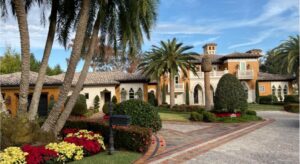
The home of Eric and Diane Holm. (Orange County Property Appraiser’s Office)
The Holms were listed on a flyer posted on social media by Rep. Anna Eskamani for the lunch event (no word on whether it included an all-you-can-eat buffet or a chocolate fountain) as part of the event’s host committee. The flyer for the Trump campaign event featuring the vice presidential candidate also listed as “hosts:” Rep. Aaron Bean; Agriculture Commissioner Wilton Simpson; Rep. Kat Cammack; Chief Financial Officer Jimmy Patronis; Rep. Michael Waltz; Ricky Caplin and Nancy McGowan.
Seats started at $5,000 per couple, according to the flyer, all the way up to $100,000 per couple.
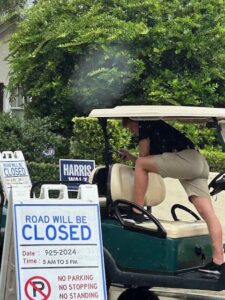
A Harris sign peeks out from a front yard near a fundraiser that reportedly featured J.D. Vance on Wednesday afternoon.
At least one house on a closed stretch of road near the event had a “Harris/Walz” sign in the front yard that was obscured by what appeared to be valet golf carts.
The Holms have hosted a number of charity events at their home, which features a room dedicated to their English Bulldog with a custom carrousel style bed, according to a 2019 story in Winter Park Magazine.
Holm is also known for his charitable work, including a Thanksgiving dinner for more than 20,000 at the Salvation Army in Orlando known as “Helpings from the Heart.”
WinterParkVoiceEditor@gmail.com
To comment or read comments from others, click here →

by Beth Kassab | Sep 22, 2024 | Election, News, Uncategorized
Text poll appears to test possible attacks in District 5 County Commission race
Steve Leary and Kelly Semrad will face off on the Nov. 5 ballot for the district that includes Winter Park
Sept. 23, 2024
By Beth Kassab
Somebody is testing potential attack ads against Kelly Semrad, the candidate who finished first in last month’s primary election for Orange County Commission District 5.
A poll received earlier this month by voters in the district asked multiple questions evaluating possible lines of attack against Semrad – while also testing positive messages for Steve Leary, the former Winter Park mayor who finished second in last month’s primary and now faces a one-on-one runoff with Semrad on the Nov. 5 ballot.
The poll could be a preview of last-minute attacks ads that could surface in the closing weeks or days of the campaign, whether from Leary’s campaign itself or surrogates such as Orlando Mayor Buddy Dyer or the Florida Realtors lobbying group, both of which paid for ads helping Leary during last month’s primary.
Semrad, a UCF professor, and Leary are vying for one of three seats up for election this year that will shape the makeup of the Orange County Commission at a time when developers are seeking permission to transform vast rural areas into subdivisions.
The poll stated clear falsehoods about Semrad such as “Kelly Semrad has no plans to protect Orange County’s environment and natural areas from urban sprawl.”
In reality, Semrad is an outspoken advocate for two referendums that will also appear on the November ballot. The first asks voters to designate a rural boundary in the county and the second would give the County Commission the power to stop potential developers from voluntarily annexing their land into other jurisdictions such as the city of Orlando.
The rural boundary and annexations have emerged as key issues in the District 5 race as well as the contests in districts 1 and 3. Leary has said he supports establishing the rural boundary, but has not answered a question that would give the rural boundary measure its teeth: Whether he supports the move to allow the county commission to block annexations by the cities.
The same poll question stated that Semrad’s “husband works for the largest developers in Central Florida helping to prep land by clearing trees, destroying natural habitats and erasing rural and agricultural lands, all to make way for more sprawl neighborhoods. How convincing is that statement as a reason to vote against Kelly Semrad?”
Semrad said her life partner (they aren’t married) is an engineer who works in construction, but considered the statement to be a mischaracterization of his work that she said focuses on roads and urban redevelopment.
His firm’s website lists Universal Orlando, Tavistock and major homebuilders among its clients — the same companies that have contributed heavily to Leary’s campaign fund and political action committee. So, using the same logic, the poll question also appears to suggest those companies participate in “destroying natural habitats and erasing rural and agricultural lands, all to make way for more sprawl neighborhoods.”
Leary and his campaign did not respond to multiple calls and emails seeking comment for this story.
It’s unclear who paid for the survey, which was sent by company called Research Polls that lists its address as a canal-front condominium in downtown Fort Lauderdale. When this reporter went to website linked in the text message for the poll, the page said, “Share your opinions on Orange County” followed by, “Thank you for your interest in this survey. The survey is now closed.”
The survey also attempted to question Semrad’s credibility on one of her central platforms — pushing the county to diversify how it spends the Tourism Development Tax, a levy collected on hotel beds, beyond projects backed by the industry.
“Kelly Semrad claims to be a tourism expert, but she’s never worked in the industry. If she misrepresents her own background, she can’t be trusted to represent Orange County. How convincing is that statement as a reason to vote against Kelly Semrad?”
“Boy, do I wish that were true,” Semrad said in response to the question, noting that she started bussing tables at age 12 and working early morning shifts at a restaurant in Wisconsin to help her mom make ends meet.
It was the first of multiple service and hospitality industry jobs, she said, including server, bartender and housekeeper.
After college, she said she tried working in management.
“When I found out that the work conditions weren’t better, I went back to school and got my PhD and have dedicated my career to making conditions better for people who work in the tourism and hospitality industry,” Semrad said.
She started working at UCF in 2013 after working for several years at the University of Florida. She is considered an expert in market analyses, revenue and risk management and social and environmental justice in the tourism industry. She’s authored papers published in the Journal of Hotel & Business Management and the Research Journal of Hospitality and Tourism Management among others.
The poll also asked voters if they have favorable or unfavorable views of “the tourism and hospitality industry,” “housing developers,” “environmental organizations” and “local labor unions” among others.
Neither candidate has shown much financial activity since the Aug. 20 primary, though the financial reports filed with the Orange County Supervisor of Elections Office lag by a couple weeks.
Leary has raised the most, but spent the bulk ahead of the Aug. 20 primary. He has collected nearly $200,000 in his campaign fund and has about $30,000 left to spend, according to reports filed with the Orange County Supervisor of Elections Office.
Leary’s political action committee called Neighbors for a Sensible Orange County has raised about $43,000 in cash and has about $37,000 left to spend.
Semrad has raised about $60,000, according to campaign filings, and has about $7,000 left to spend.
With six weeks until the election, there is still time for both candidates to raise funds and for Leary to spend his remaining cash.
WinterParkVoiceEditor@gmail.com
To comment or read comments from others, click here →













Recent Comments